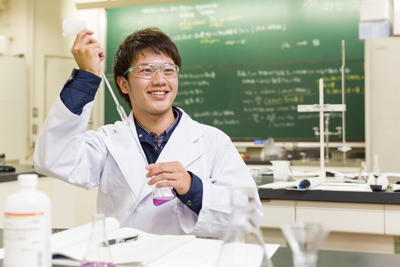About the School of Food and Nutritional Sciences

Solutions to complex problems related to food and health require an integrated scientific knowledge of such disciplines as chemistry, biology, physiology, food science, nutrition, environmental science, engineering, and medicine, as well as practical application skills. The School of Food and Nutritional Sciences provides systematic learning opportunities in life sciences fields related to food, nutrition, and environmental sustainability, allowing students to access cutting edge research in these frontier sciences. With an increasing population of elderly people in Japanese society, along with an increase in the number of people suffering from lifestyle-related diseases, there is increasing demand both for advanced scientific knowledge of nutrition and for skills related to its application. The School consists of three departments. The Department of Food Science and Biotechnology focuses on the chemistry of food ingredients, food safety, food processing, food production, and related biotechnology, leading students to become experts in food-related industry, food safety, and food function. The Department of Nutrition and Life Sciences focuses on the basic principles of life sciences related to nutrition and human health. The Department of Environmental and Life Sciences focuses on the fields of environmental science and engineering related to food and human health. The three Departments cooperate to develop the School’s advanced education and research programs.
Department of Food Science and Biotechnology
The Department of Food Science and Biotechnology admits 25 students per year. Its education program is divided into the three major categories: chemistry of food components, science and engineering of food production and processing, and hygiene and toxicology of food-related substances. Many of the lectures conducted in the course are accompanied by experiments and practical training. Students are required to attend lectures on biotechnology and life sciences, which cover the latest research in those fields. Some courses offered by the other departments, the Department of Nutrition and Life Sciences and the Department of Environmental and Life Sciences, are also available to Food Science and Biotechnology students.
Department of Nutrition and Life Sciences
The Department of Nutrition and Life Sciences admits 25 students per year. The education program is composed of three major steps: the first step covers the basic mechanisms of life and health maintenance through biochemistry and physiology; the second covers the metabolism and nutritional aspects of food components; and the third covers the public and clinical aspects of nutrition, with an emphasis on training in the practical skills required for dietetics professionals, including nutritional care and management, nutrition education, and food management. Students are also encouraged to take courses offered by the Department of Food Science and Biotechnology.
Department of Environmental and Life Sciences
The Department of Environmental and Life Sciences admits 20 students per year. The education program is divided into three major categories: environmental analysis, risk evaluation of environmental factors, and environmental engineering. Many of the lectures conducted in the course are accompanied by experiments and practical training. Students are required to attend lectures on environmental and life sciences, which cover the latest research in those fields. Students are also encouraged to take courses offered by the Department of Food Science and Biotechnology.



